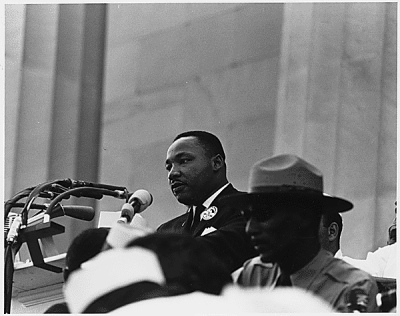His Dream, My Reality

On August 28, 1963, the great reformer, Dr. Martin Luther King, Jr. delivered his iconic "I Have a Dream" speech from the hallowed steps of the Lincoln Memorial. I wasn't there.
I was only two-years-old, living in the small island nation of Jamaica, until my family and I migrated to America in 1969. But Dr. King's words lingered in the global atmosphere down through the decades until they found a permanent home in the recesses of my heart. His dream became my dream. And, over time his dream became my reality.
I pastor a multiracial and multiethnic congregation with some 70 different nationalities in northern New Jersey. Each Sunday, African-Americans, whites, Hispanics and Asians gather together to unite our voices and hearts in songs of praise to our Lord and Savior, Jesus Christ. Quite often we hold hands in prayer, as we humbly ask God to bring healing to our nation that still struggles with racial unrest and injustices. For some worshippers, the struggle for acceptance, forgiveness, and racial healing is an ongoing work in progress. Yet, they faithfully join in the midst of our blended experience because deep down inside they know that in a divided society the church must model unity.

Living in a free country affords us a wonderful privilege to choose where to attend church. Some even opt never to attend church. And, that is their right. Let me let you in on an often overlooked pastoral observation. When someone chooses to attend a particular church, they voluntarily give the minister access and permission to respectfully enter into the private and personal aspects of their life. It is a humbling and powerful action that I, along with other pastors, will never take for granted. That said, when a white, Hispanic or Asian family comes to Christ Church they are making a tremendous gesture that says, "Pastor, regardless of the fact that you are African-American, I'm asking you to care for me by helping me grow as a follower of Jesus Christ." When Dr. King bellowed, "I have a dream today that my four little children will one day live in a nation where they will not be judged by the color of their skin but by the content of their character," my present experience is a realization of his dream. I'm being judged by my character and not by my skin. Hence, many non-blacks see me as their potential minister. And, my character sealed the deal for those who select me as their pastor.
There are times speeches and sermons become memorable and historic long after they've been delivered. Some vague thought flickers in the crevices of someone's mind and they go on a safari to hunt down those words they heard long ago—words that have escaped the souls of many. Being a preacher, I know. I've delivered many sermons only to question a few days later: "What did I preach on?" Yet, there are rare moments that the instant the words leave the orator's lips they become the bedrock to a better society. Such was the case with the I Have a Dream Speech. Dr. King's immortal words quickly found a resting place in the hearts of Americans.
They certainly found a home in my heart. Dr. King painted this picture in my imagination when he said he longed for the day when, "little black boys and black girls will be able to join hands with little white boys and white girls as sisters and brothers." Glimpses of his dream have become frequent sightings in my ministry and personal life. I have discovered that the more I hold to the personal values of reconciliation, the more it becomes my reality.
Monday, January 15th is a national holiday—Dr. Martin Luther King Day. For some, it's just a day off from work. For me, it's a moment to pause and give thanks because of his dream. It's also an opportunity for all of us to be reflective because reconciliation is everyone's responsibility. Just like prejudice is everyone's problem.
David D. Ireland is the senior pastor of Christ Church, a multisite church in northern New Jersey with a membership of 8,800. He is a diversity consultant to the NBA and author of some 20 books, including soon to be released One in Christ. For more information please visit: http://ChristChurchUSA.org, @DrDavidIreland and http://davidireland.org





















